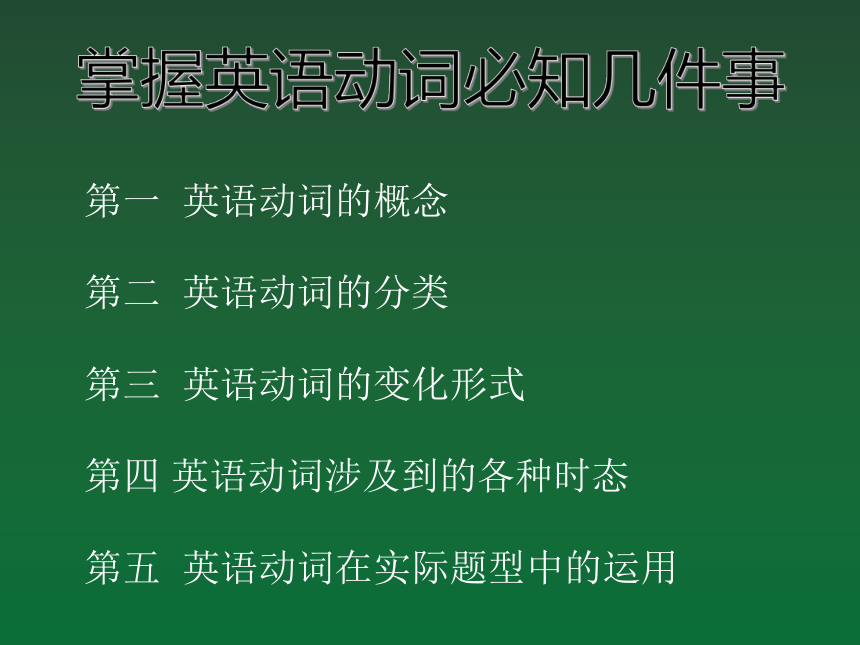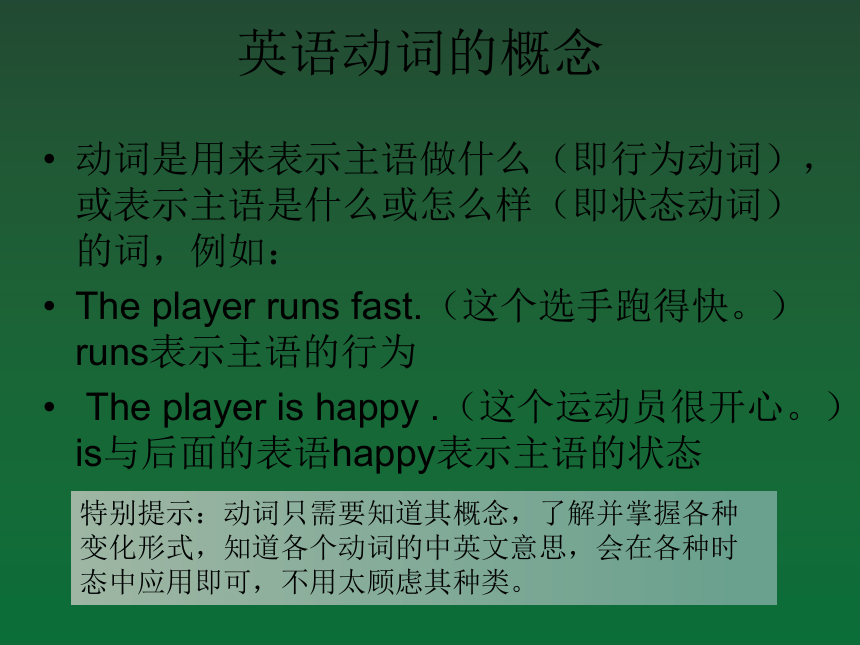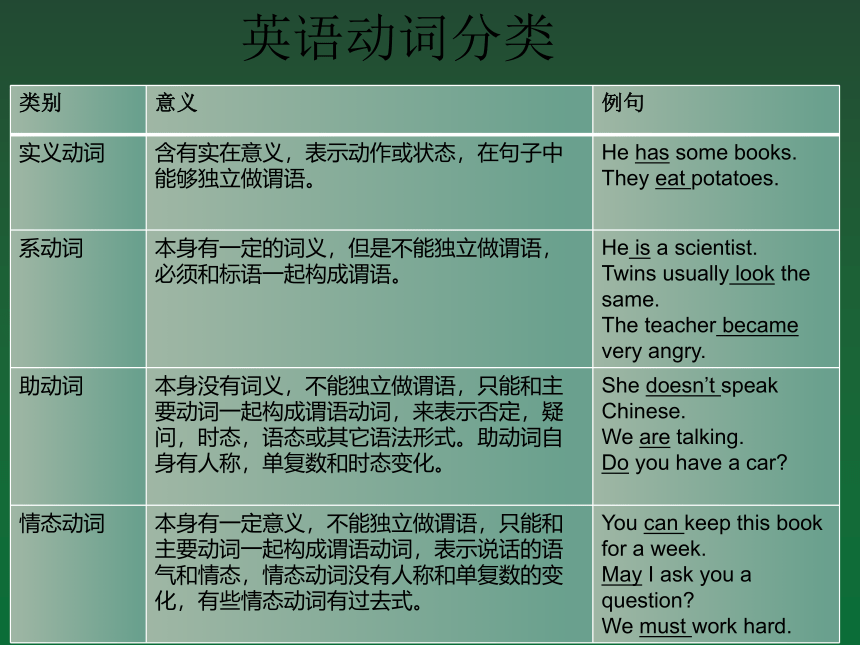中考英语语法课件:英语最核心词汇之动词辨析
文档属性
| 名称 | 中考英语语法课件:英语最核心词汇之动词辨析 |  | |
| 格式 | pptx | ||
| 文件大小 | 75.6KB | ||
| 资源类型 | 试卷 | ||
| 版本资源 | 通用版 | ||
| 科目 | 英语 | ||
| 更新时间 | 2022-03-04 09:16:31 | ||
图片预览





文档简介
(共11张PPT)
英语最核心词汇动词
-高山英语空中课堂
掌握英语动词必知几件事
第一 英语动词的概念
第二 英语动词的分类
第三 英语动词的变化形式
第四 英语动词涉及到的各种时态
第五 英语动词在实际题型中的运用
英语动词的概念
动词是用来表示主语做什么(即行为动词),或表示主语是什么或怎么样(即状态动词)的词,例如:
The player runs fast.(这个选手跑得快。)runs表示主语的行为
The player is happy .(这个运动员很开心。)is与后面的表语happy表示主语的状态
特别提示:动词只需要知道其概念,了解并掌握各种变化形式,知道各个动词的中英文意思,会在各种时态中应用即可,不用太顾虑其种类。
英语动词分类
类别 意义 例句
实义动词 含有实在意义,表示动作或状态,在句子中能够独立做谓语。 He has some books.
They eat potatoes.
系动词 本身有一定的词义,但是不能独立做谓语,必须和标语一起构成谓语。 He is a scientist.
Twins usually look the same.
The teacher became very angry.
助动词 本身没有词义,不能独立做谓语,只能和主要动词一起构成谓语动词,来表示否定,疑问,时态,语态或其它语法形式。助动词自身有人称,单复数和时态变化。 She doesn’t speak Chinese.
We are talking.
Do you have a car
情态动词 本身有一定意义,不能独立做谓语,只能和主要动词一起构成谓语动词,表示说话的语气和情态,情态动词没有人称和单复数的变化,有些情态动词有过去式。 You can keep this book for a week.
May I ask you a question
We must work hard.
英语实义动词变化之三单形式
规则 动词原形 第三人称
单数形式
s 一般在词尾加s(读音规则清清浊浊元浊,在清辅音后读清辅音/s/,在浊辅音和元音后读/z/ stop take clean play grow stops/s/ takes/s/
cleans/z/ plays/z/
grows/z/
es 以,x,ch,sh,,或o结尾的动词加-es(读/iz/ pass fix wash watch do passes fixes washes watches does
ies 以辅音字母加y结尾的动词,变y为ies(读作/iz/) fly carry hurry flies carries hurries
英语实义动词变化之现在分词
词尾变化 举例
一般加-ing Look—looking
try—trying
以不发音的e结尾的词,去掉e ,再加-ing write—writing
dance—dancing
以一个辅音字母(x除外)词尾的重读闭音节词,先双写词尾的辅音字母,再加-ing swim-swimming
box-boxing
Run—running,sit-—sitting
以-ie结尾的词,变ie为y ,再加-ing Die-—dying, lie---lying
英语实义动词变化之过去式及分词
规则动词过去式的构成(过去分词和过去式的变化规则一样)
1: 一般在动词末尾加-ed.
look—looked open—opened
play—played borrow—borrowed
2:以e结尾的动词加-d
use—used live—lived
dance—danced recite— recited
3:以“辅音子母+y”结尾的动词,变y为i,再加-ed.
study—studied carry—carried
try—tried worry—worri ed
4:末尾只有一个辅音的重读闭音节,先双写该辅音字母,再加-ed.( fix的过去式和过去分词x不双写,为fixed.) stop—stopped plan—planned
英语动词8种相关核心时态
We study Chinese every day.(1)
John studies Chinese all day.(1)
Tom studied English last weekend.(2)
Lily is studying art now/at the moment.(3)
Lucy was studying art at the moment yesterday.(4)
We have studied Chinese for over twenty years.(5)
We will study a new language-French next week.(6)
Lucy said she would study abroad in ten years.(7)
Lily had studied her homework for an hour before her mother came back from work.(8)
英语动词在实际题型中的运用
用所给动词的适当形式填空
1.Mother ________ (watch) TV every evening.
2.We________ (talk) when the teacher came in.
3.He ________(go) to Beijing two days ago.
4.He ________ (leave) Chengdu in two days.
5.Look! The boy___________(play) football on the playground.
6.My uncle _________ (live) here for ten years.
7.He often helps the old woman __________ (carry) water.
8.Would you like to make a contribution to ________ (improve) our living conditions
9.Don’t forget ________(turn) off the lights before you go out.
10.Please let the girls _____(go) first.
watches
were talking
went
will leave
is playing
has lived
carry/to carry
improving
to turn
go
英语动词在实际题型中的运用
11.They had great fun ________(play) football this afternoon.
12.Do you enjoy ________ (watch) TV
13.Would you like ______ (have) a cup of tea
14.You can ______(go) there tomorrow.
15.Would you mind my _____ (open) the door
16.Please ask him _______ (speak) more loudly
17.I’ll go fishing if it ____ (be) fine tomorrow.
18.He said his grandpa ________ (be) dead for ten years.
19.Tell the children __________ (not play) in the street.
20.Mr Zhu spent much time _________(help) his son.
playing
watching
to have
go
opening
to speak
is
had been
not to play
helping
Bye-bye
Many thanks
英语最核心词汇动词
-高山英语空中课堂
掌握英语动词必知几件事
第一 英语动词的概念
第二 英语动词的分类
第三 英语动词的变化形式
第四 英语动词涉及到的各种时态
第五 英语动词在实际题型中的运用
英语动词的概念
动词是用来表示主语做什么(即行为动词),或表示主语是什么或怎么样(即状态动词)的词,例如:
The player runs fast.(这个选手跑得快。)runs表示主语的行为
The player is happy .(这个运动员很开心。)is与后面的表语happy表示主语的状态
特别提示:动词只需要知道其概念,了解并掌握各种变化形式,知道各个动词的中英文意思,会在各种时态中应用即可,不用太顾虑其种类。
英语动词分类
类别 意义 例句
实义动词 含有实在意义,表示动作或状态,在句子中能够独立做谓语。 He has some books.
They eat potatoes.
系动词 本身有一定的词义,但是不能独立做谓语,必须和标语一起构成谓语。 He is a scientist.
Twins usually look the same.
The teacher became very angry.
助动词 本身没有词义,不能独立做谓语,只能和主要动词一起构成谓语动词,来表示否定,疑问,时态,语态或其它语法形式。助动词自身有人称,单复数和时态变化。 She doesn’t speak Chinese.
We are talking.
Do you have a car
情态动词 本身有一定意义,不能独立做谓语,只能和主要动词一起构成谓语动词,表示说话的语气和情态,情态动词没有人称和单复数的变化,有些情态动词有过去式。 You can keep this book for a week.
May I ask you a question
We must work hard.
英语实义动词变化之三单形式
规则 动词原形 第三人称
单数形式
s 一般在词尾加s(读音规则清清浊浊元浊,在清辅音后读清辅音/s/,在浊辅音和元音后读/z/ stop take clean play grow stops/s/ takes/s/
cleans/z/ plays/z/
grows/z/
es 以,x,ch,sh,,或o结尾的动词加-es(读/iz/ pass fix wash watch do passes fixes washes watches does
ies 以辅音字母加y结尾的动词,变y为ies(读作/iz/) fly carry hurry flies carries hurries
英语实义动词变化之现在分词
词尾变化 举例
一般加-ing Look—looking
try—trying
以不发音的e结尾的词,去掉e ,再加-ing write—writing
dance—dancing
以一个辅音字母(x除外)词尾的重读闭音节词,先双写词尾的辅音字母,再加-ing swim-swimming
box-boxing
Run—running,sit-—sitting
以-ie结尾的词,变ie为y ,再加-ing Die-—dying, lie---lying
英语实义动词变化之过去式及分词
规则动词过去式的构成(过去分词和过去式的变化规则一样)
1: 一般在动词末尾加-ed.
look—looked open—opened
play—played borrow—borrowed
2:以e结尾的动词加-d
use—used live—lived
dance—danced recite— recited
3:以“辅音子母+y”结尾的动词,变y为i,再加-ed.
study—studied carry—carried
try—tried worry—worri ed
4:末尾只有一个辅音的重读闭音节,先双写该辅音字母,再加-ed.( fix的过去式和过去分词x不双写,为fixed.) stop—stopped plan—planned
英语动词8种相关核心时态
We study Chinese every day.(1)
John studies Chinese all day.(1)
Tom studied English last weekend.(2)
Lily is studying art now/at the moment.(3)
Lucy was studying art at the moment yesterday.(4)
We have studied Chinese for over twenty years.(5)
We will study a new language-French next week.(6)
Lucy said she would study abroad in ten years.(7)
Lily had studied her homework for an hour before her mother came back from work.(8)
英语动词在实际题型中的运用
用所给动词的适当形式填空
1.Mother ________ (watch) TV every evening.
2.We________ (talk) when the teacher came in.
3.He ________(go) to Beijing two days ago.
4.He ________ (leave) Chengdu in two days.
5.Look! The boy___________(play) football on the playground.
6.My uncle _________ (live) here for ten years.
7.He often helps the old woman __________ (carry) water.
8.Would you like to make a contribution to ________ (improve) our living conditions
9.Don’t forget ________(turn) off the lights before you go out.
10.Please let the girls _____(go) first.
watches
were talking
went
will leave
is playing
has lived
carry/to carry
improving
to turn
go
英语动词在实际题型中的运用
11.They had great fun ________(play) football this afternoon.
12.Do you enjoy ________ (watch) TV
13.Would you like ______ (have) a cup of tea
14.You can ______(go) there tomorrow.
15.Would you mind my _____ (open) the door
16.Please ask him _______ (speak) more loudly
17.I’ll go fishing if it ____ (be) fine tomorrow.
18.He said his grandpa ________ (be) dead for ten years.
19.Tell the children __________ (not play) in the street.
20.Mr Zhu spent much time _________(help) his son.
playing
watching
to have
go
opening
to speak
is
had been
not to play
helping
Bye-bye
Many thanks
同课章节目录
- 词法
- 名词
- 动词和动词短语
- 动词语态
- 动词时态
- 助动词和情态动词
- 非谓语动词
- 冠词
- 代词
- 数词和量词
- 形容词副词及其比较等级
- 介词和介词短语
- 连词和感叹词
- 构词法
- 相似、相近词比较
- 句法
- 陈述句
- 一般疑问句和否定疑问句
- 特殊疑问句及选择疑问句
- 反意疑问句
- 存在句(There be句型)
- 宾语从句
- 定语从句
- 状语从句
- 主谓一致问题
- 简单句
- 并列句
- 复合句
- 主谓一致
- 主、表语从句
- 名词性从句
- 直接引语和间接引语
- 虚拟语气
- 感叹句
- 强调句
- 倒装句
- 祈使句
- 句子的成分
- 句子的分类
- 题型专区
- 单项选择部分
- 易错题
- 完形填空
- 阅读理解
- 词汇练习
- 听说训练
- 句型转换
- 补全对话
- 短文改错
- 翻译
- 书面表达
- 任务型阅读
- 语法填空
- 其他资料
